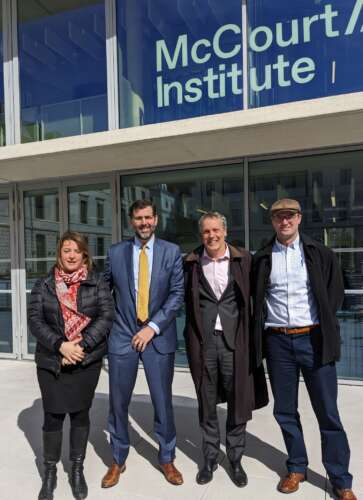A new, first-of-its-kind graduate training program hosted by universities in France and Canada aims to create the next generation of environmental leaders.
The University of Guelph is partnering with Sciences Po – a university based in Paris and recognized globally for international relations – the University of Toronto and University of British Columbia to launch the Climate Adaptation, Resilience and Empowerment (CARE) Program.
Their collective goal is to accelerate climate action through hands-on academic, policy and leadership training, especially amid the prevailing crises of climate change, biodiversity loss and pollution.
Led by Sciences Po and its Paris School of International Affairs, the CARE Program is made possible through a five-year €7.2 million (about $10.5 million CAD) grant from Fondation David R. Graham, which supports meaningful opportunities for cultural exchange between Canada and France.

“The University of Guelph is delighted to join the CARE Program and collaborate with Sciences Po and the Universities of Toronto and British Columbia to support the development of a new generation of climate leaders,” says Dr. Charlotte Yates, U of G president and vice-chancellor.
“Given our expertise in climate change mitigation and adaptation within agri-food systems and other working landscapes, the University of Guelph is ideally positioned to support this innovative collaboration.”
Scholarships valued at €25,000 (about $36,700 CAD) will enable French nationals to complete a master’s degree at the University of Guelph, while fellowships valued at €5,000 (about $7,300 CAD) will be available for U of G master’s students enrolled in a variety of programs to study at a partner university for upwards of three months.
In addition, U of G master’s students will have the opportunity to participate in interdisciplinary courses run between the universities, including a multi-campus climate leadership course, complete collaborative projects, develop their communications and diplomatic capacities, and attend annual conferences at one of the four participating Universities.
The collaboration will showcase the unique strengths of the U of G and enable faculty to visit partner universities and recruit students to master’s research programs.
Dr. Madhur Anand is an ecology professor at U of G’s School of Environmental Sciences and one of several participating faculty members.
She says, “At the University of Guelph, we appreciate the role of local knowledge systems, including Indigenous knowledge systems, in responding to the climate crisis. We also understand the critical connections between the global climate and biodiversity crises. We expect to bring these considerations to this exciting new collaboration.”
The CARE Program hopes to expand to other higher education partners around the world and to reach over 2,000 students in five years.
Contact:
Dr. Ben Bradshaw
Assistant vice-president (graduate studies)
ben.bradshaw@uoguelph.ca
